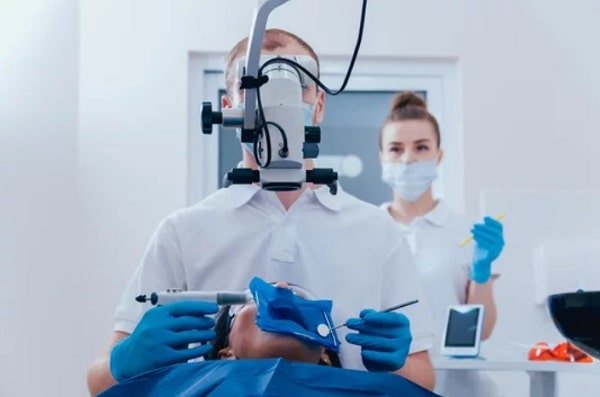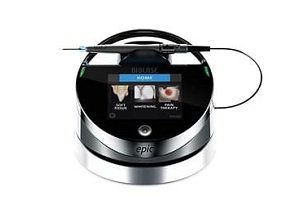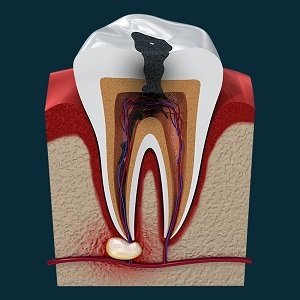


Root Canal Treatment
Experiencing severe pain?
Need a root canal?
Root canal treatment can quickly relieve you of your pain without having to resort to surgery.
Best In Jamnagar
At Perfect Dental® our root canal specialist use Latest High End Technology and provide excellent root canals without pain.
- High Optical Quality Dental Microscope
- Biolase EpicX Dental Laser
- NSK-Japan Endomotor
- NSK-Japan apex locator




Get an EXPERT consultation with us
- Get a thorough examination of your teeth and oral health with our specialized equipment.
- Get an expert diagnosis and fully understand what your options are.
- Get an expert recommendation for what to do next.
What is Root Canal Treatment (RCT)?
Root canal treatment is a treatment sequence for the infected pulp of a tooth which is intended to repair and save a tooth that is badly decayed or becomes infected. During a root canal procedure, the nerve and pulp are removed and the inside of the tooth is cleaned and sealed.
Root Canal Treatment (RCT) results in the elimination of infection and the protection of the decontaminated tooth from future microbial invasion. Without treatment, the tissue surrounding the tooth will become infected and abscesses may form.
Some of the symptoms which are indicative of root canal procedure are deep cavity, tooth pain, abscess near root end, sensitivity on eating hot or cold food items which persists for long period or tooth darkening or brown discoloration etc.
What happens if I don’t get Root Canal Treatment?
Whenever you have severe pain in your tooth then most probably you may require Root canal treatment.
If you have been told by the dentist that you need root canal treatment don’t procrastinate, this simple procedure could be the difference between saving your tooth or losing it all together.
Like other infections, an infected pulp of the tooth will not heal on its own; it will only get worse, so a Root canal treatment is the recommended treatment for save a tooth.
Sometimes, the pain might disappear and patients may think the infection has healed itself, however, this is just a sign that the nerves inside of the tooth have died. While there may no longer be pain present, the infection will still be inside the tooth.
If you don’t get root canal treatment then there will be chances that your questionable tooth might get infected, pus formation will be there and you will also have swelling in that region which are signs of Dental abscess.
The infection can spread from the tooth in question to the gum and jawbone surrounding the decaying or infected pulp. This could lead to the loss of the tooth or, in severe cases, the loss of part of your jaw. In most cases, the only option apart from a root canal is extraction of the tooth.
If you do not undergo Root canal treatment or get the tooth removed, then the consequences can be severe. An untreated root canal can also lead to dental abscesses, which may be end up with the space infection or a life-threatening heart attack, stroke, or sepsis. Not to mention the fact that if your infection progresses to this point, you will likely be in extreme pain and in some cases the bacterial infection can spread to the jaw, brain, blood and rest of the body.
Though it sounds scary, a root canal is a routine procedure that can prevent the spread of infection, alleviate pain, and save your tooth. So if your dentist recommends this form of treatment, trust his or her judgment and ask any questions that would make you feel more comfortable with the procedure.
What is done in root canal treatment?

A root canal is a complex process that involves a number of steps. Prior to beginning the actual root canal procedure, the root canal specialist plan treatment based on clinical examination and your X-ray and then he will administer the appropriate anesthesia to ensure that you feel entirely comfortable throughout the procedure.
Then the specialist goes through the following steps:
Step 01

As a starting point for performing root canal treatment, your dentist will need to gain access to tooth’s nerve space. This step is called creating an “access cavity”. Your dentist will use their dental drill to make a hole that extends through the surface of your tooth to its pulp chamber. This is the opening through which they will gain access to pulp and perform their work.
When creating the access cavity, the dentist will also remove all tooth decay and any loose or fragile portions of the tooth or its filling.
Step 02

Your dentist’s goal will be to treat the entire length of your tooth’s nerve space (root canal) but not beyond. Doing so is not only important part of the treatment process but also helps to minimize post-operative pain.
To be able to work within these confines, your dentist must measure the length of each of your tooth’s root canals accurately. This measurement is typically calculated to the nearest 0.5 mm. Your dentist may use apex locator to measure your root canal length accurately. During this step your dentist will also determine number of canals present in the tooth and shape of canals or tooth roots.
Step 03

The next step of the root canal procedure involves “cleaning and shaping” the interior of the tooth or root canals. The cleaning aspect removes nerve tissue (live and/or dead) as well as bacteria, toxins and other debris harbored inside the tooth.
Shaping refers to a process where the configuration of a tooth’s canals are enlarged and flared so they have a shape that is ideal for the proceeding to final step of filling and sealing.
Step 04

Once the interior of the tooth has been thoroughly cleansed and properly shaped, it’s ready to be sealed or have its hollow interior filled in.
In some cases, the dentist will want to place the filling material immediately after they have finished cleaning the tooth, where in some other cases, they may feel that it is best to wait about a week before performing this step.
Step 05

The final step in root canal treatment is evaluation of the treatment quality. Your dentist may take an X-ray and determine the overall quality of performed root canal treatment. Your dentist has in general done a good job, if he has been able to fill each canal of the tooth root to the determined length, which was done in step 2 of root canal procedure and the canals are filled tightly without any leaks and forming a hermetic seal.
A successful root canal is not painful (it may take some days to settle as the dentist will have instrumented and aggravated the tissues around the end of the tooth). There are no symptoms or tenderness and mobility has not increased.
Dentistry is NOT EXPENSIVE BUT...

In most cases, dental problems start small and then grow. The bigger or more complex a dental issue is, the more costly it is to treat. Please do not delay your dental treatment.
Perfect Dental® is well versed with the latest advances in the field of dentistry and our root canal specialist dentist carry out the root canal procedures with cutting edge technology, which provides precision in cutting and guides the way towards the root canal apex with Apex Locator while performing the procedure .We also provide Rotary RCT treatments which are performed with utmost ease, to ensure that your entire treatment experience becomes pleasant and pain free.
We provide root canal treatment using the loupes which aid in better magnification of the desired field and provide utmost precision while performing the root canal procedure. We also use rubber dams to isolate the infected region, thus making it dry and free from salivary contamination. The latest RCT procedures are performed with lasers to ensure that your infected tooth becomes completely free from bacteria.
No matter how badly deformed your teeth are, we use the most versatile brand of products having superior properties and characteristics in order to restore your natural teeth and provide the most satisfying and desirable results . More on this our root canal specialist dentist in Jamnagar, eliminate any sort of anxiety or discomfort, thereby making the entire Root Canal Treatment procedure pain and hassle free.
What are the advantages of RCT over other treatment procedures?
- In case of a deeply infectious tooth, the only treatment options are removal of tooth or the root canal treatment (RCT). However, root canal treatment (RCT) is a conservative procedure through which natural tooth is saved.
- Root canal treatment (RCT) prevents bone loss and preserves the stability of the adjacent tooth.
- Most of the time the pain is related to the pulp tissue only rather than that the procedure is more or less painless.
- It is quite cost-effective & better option as compared to other teeth replacement procedures after extraction, saving the natural tooth by root canal treatment (RCT).
What are the limitation of Root Canal Treatment?
- Excessively Decayed tooth beyond repair cannot be treated.
- Fractured roots.
- Deep infection/ injury beyond tooth root with cysts around them.
- Excessively curved roots.
- Excessively mobile tooth.
- Restricted mouth opening.
- Root canal treatment (RCT) is technique sensitive, requiring professional skill and may require multiple visits.
- If not done by an expert, if accessory canals remain untreated which may lead to failure resulting in reinfection and pain.
- RCT makes the tooth brittle & hence, root canal treated tooth needs to be covered with a crown to prevent its fracture.
F.A.Q.
Root Canal Treatment
At Perfect Dental® our top most priority is that our patient should get painless treatment. We use advanced techniques and ultramodern high end equipment like NSK – Japan endomotor and apex locator and most of our patients say that they had a very pleasing experience and they did not feel any pain during root canal treatment.
Root canal treatment removes all infection from the root canal system of the tooth. Most root treatments involve at least two visits to your dentist. This usually alleviates any pain from the tooth. On the second visit the root canal is cleaned, disinfected, shaped, measured and filled to prevent any further infection. Perfect Dental® is best dental clinic in Jamnagar for root canal treatment.
Root canal therapy, also known as endodontic therapy, is a dental treatment for removing infection from inside a tooth. It can also protect the tooth from future infections. It is always a better idea to get root canal treatment done, when your dentist recommends for it.
The first step in the procedure is to take an X-ray to see the shape of the root canals and determine if there are any signs of infection in the surrounding bone. Your dentist or Endodontist will then use local anesthesia to numb the area near the tooth.
Root canal treatment is done in 3 stages:
Stage 1: involves removal of the dead nerve and the gross infection.
Stage 2: this involves further cleaning and shaping of the root canals.
Stage 3: this is the last stage in the completion of treatment which involves filling the canals with an inert filling material to form a hermetic seal.
Top 5 Benefits of Root Canal Treatment
-It Stops the Spread of Infection to Neighboring Teeth.
-It has a Virtually Appealing Result and You May Start Feeling Results Even From The First Setting.
-It Aims to Save Your Teeth.
-It Prevents the Jawbone to Degenerate.
-It Enhances Oral and Overall Health.
You typically need a dental crown after a root canal on your back grinding teeth, molars and premolars. Front teeth, canines, and incisors may not require a dental crown.
Perfect Dental® in Jamnagar is the best dental clinic for root canal treatment (RCT) in Jamnagar. We have highly experienced endodontist who performs best root canal treatment with very high precision and comfort. We use advance techniques and latest equipment in dentistry and we have highest success rate in root canal treatment (RCT) in Jamnagar.